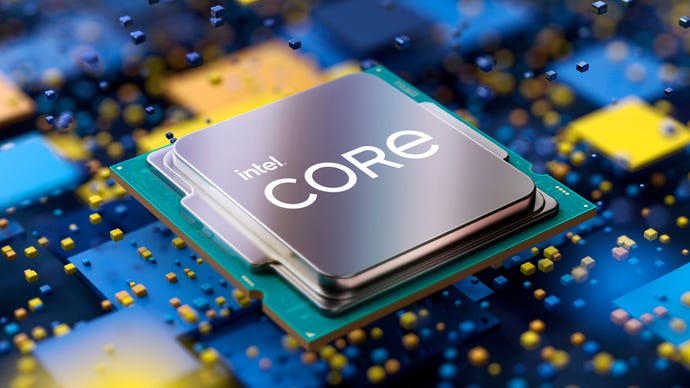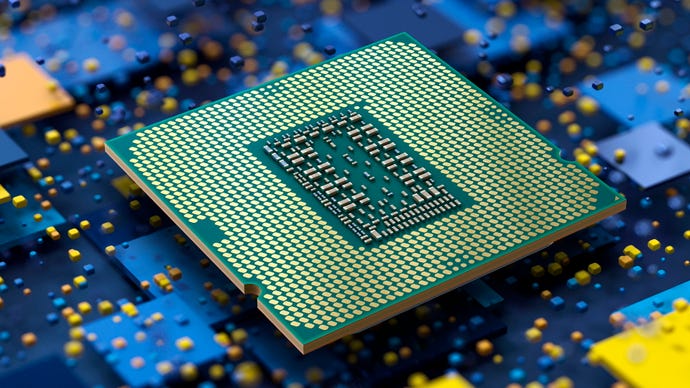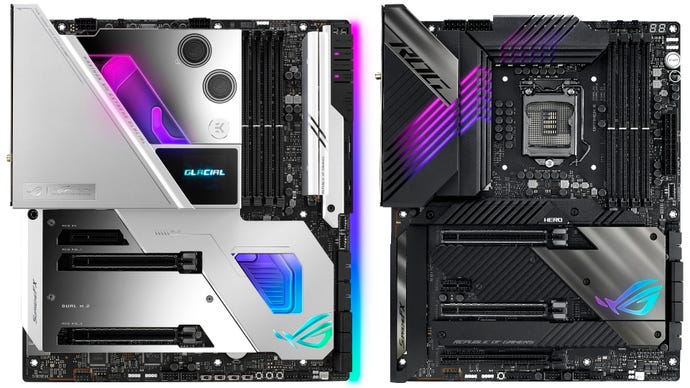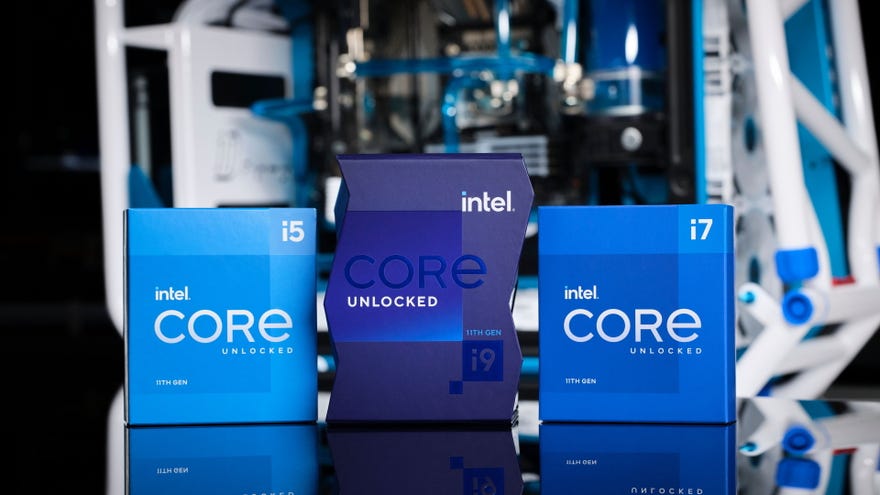Intel 11th Gen Rocket Lake CPUs: everything you need to know
Specs, release date and all the important tech upgrades
After months of waiting, the official release of Intel's new 11th Gen Rocket Lake CPUs is now just a couple of weeks away. Launching as planned at the end of March, Rocket Lake will not only usher in a whole new generation of Intel gaming processors, but several key tech improvements that finally bring them up to speed with AMD's Ryzen 5000 series. Chief among them is support for the super fast PCIe 4.0 standard, but perhaps more importantly, Rocket Lake will also see the introduction of memory overclocking on a much wider range of motherboard chipsets than ever before. So to help you prepare for Intel's 11th Gen CPUs, here's everything you need to know about their new Rocket Lake chips, including their specs, backwards compatibility with Comet Lake and more.
I've listed a full rundown of Intel's 11th Gen Rocket Lake CPU family below, but here's a quick summary of the headline facts. To read more about them, you can either carry on scrolling or click the links to go straight to the section in question.
Intel 11th Gen Rocket Lake CPUs: what you need to know
- Gaming performance will be up to 16% faster than Intel's 10th Gen CPUs
- There will be four new 500-series motherboards to choose from
- Memory overclocking will be available on H570 and B560 motherboard chipsets
- All 500-series boards are backwards compatible with 10th Gen Comet Lake CPUs
- Rocket Lake supports up to 20 CPU PCIe 4.0 lanes
Intel 11th Gen Rocket Lake CPU release date
The first 11th Gen Rocket Lake CPUs are launching on March 30th. They'll be available to buy as standalone CPUs and as part of whole desktop PCs on this date, and I'll be rounding up all the best places to buy a Rocket Lake CPU closer to launch.

Intel 11th Gen Rocket Lake CPU specs
Before we dive into the nitty gritty of Intel's individual Rocket Lake CPU specs, let's talk big picture stuff. Unlike Intel's 11th Gen laptop CPUs, which use a 10 nanometer (nm) manufacturing process, Rocket Lake is a bit different. Intel have been hesitant to call it 14nm+++ so far (following on from their 10th Gen Comet Lake 14nm++ process naming convention), but they described it to me as "core and graphics IP designed for 10nm transistors [which are then] ported back to larger 14nm transistors".
It's confusing, to say the least, but for the time being, it's probably best to think of it as a kind of half-way house between the 14nm process Intel's used in the past, and the proper 10nm Enhanced SuperFin process that's going to be used in Intel's next batch of upcoming 12th Gen Alder Lake chips.
Rocket Lake also uses a different core architecture to Tiger Lake. Whereas the latter use Intel's Willow Cove architecture, Rocket Lake makes use of their new Cypress Cove architecture, which is Intel's first new desktop architecture in five years. Rocket Lake is also the first set of Intel's desktop CPUs to come with their new Intel Xe graphics architecture. Together, Intel says they should deliver up to 19% instructions per clock improvements and up to 50% better integrated graphics performance gen-on-gen.
Those are the headline spec improvements. Now let's take a closer look at the individual CPU specs in the table below:
| Processor | Cores / Threads | Base / Max Turbo Boost Frequency | Memory Support | TDP | Unlocked for OC | Price |
|---|---|---|---|---|---|---|
| Intel Core i9-11900K | 8 / 16 | 3.5GHz / 5.3GHz | DDR4-2933 / 3200 | 125W | Yes | £560 / $539 |
| Intel Core i9-11900 | 8 / 16 | 2.5GHz / 5.2GHz | DDR4-2933 / 3200 | 65W | No | £430 / $439 |
| Intel Core i7-11700K | 8 / 16 | 3.6GHz / 5.0GHz | DDR4-2933 / 3200 | 125W | Yes | £390 / $399 |
| Intel Core i7-11700 | 8 / 16 | 2.5GHz / 4.9GHz | DDR4-2933 / 3200 | 65W | No | £320 / $323 |
| Intel Core i5-11600K | 6 / 12 | 3.9GHz / 4.9GHz | DDR4-2933 / 3200 | 125W | Yes | £250 / $262 |
| Intel Core i5-11600 | 6 / 12 | 2.8GHz / 4.8GHz | DDR4-2933 / 3200 | 65W | No | £220 / $213 |
| Intel Core i5-11500 | 6 / 12 | 2.7GHz / 4.6GHz | DDR4-2933 / 3200 | 65W | No | £200 / $192 |
| Intel Core i5-11400 | 6 / 12 | 2.6GHz / 4.4GHz | DDR4-2933 / 3200 | 65W | No | £170 / $182 |
These are the main Rocket Lake processors being launched at the end of March, but there will also be F versions of nearly all the CPUs mentioned above (with the exception of the Core i5-11600 and Core i5-11500), which are otherwise identical to their non-F counterparts apart from the fact they don't have any integrated graphics. There will also be several ultra-low power T versions that have TDPs of just 35W as well. In terms of gaming CPUs, though, the ones outlined above will be the ones you'll want to keep an eye on.
Alas, Intel haven't yet released any exact pricing information at time of writing, but I'll be sure to update this article with more concrete details as soon as they're available.

Intel 11th Gen Rocket Lake CPU performance
As you might have noticed from the specs table above, Intel's flagship Core i9-11900K processor now only has eight cores instead of the ten you got on its immediate predecessor, the Core i9-10900K. Intel say this is due to the size of their new Xe graphics core, and that eight cores is the largest die they can make their new architectures.
On paper, this might sound like a downgrade, but Intel are claiming that the i9-11900K will be able to deliver up to 14% better gaming performance compared to the i9-10900K at 1080p thanks to the IPC improvements they've made in Rocket's Lake's core architecture. While they didn't share exact frame rate figures with me in my advanced press briefing, their performance figures show the Core i9-11900K outperforming its 10th Gen predecessor by 13% in Total War: Three Kingdoms, the top 14% in Microsoft Flight Simulator, 9% in Gears 5 and 8% in Grid 2019.
They also showed us some percentages comparing the Core i9-11900K to AMD's Ryzen 9 5900X. Here, the Core i9-11900K showed improvements of up to 11% over the Ryzen 9 5900X using the same 1080p High settings and titles outlined above, with the biggest gains in Total War: Three Kingdoms and Microsoft Flight Simulator again. Gear 5 and Grid 2019 were slightly less impressive at just 3% and 6% faster apiece, but I'll be testing the Core i9-11900K's performance in full once I get my hands on a review sample.
More intriguing were the performance figures Intel shared for the mid-range Core i5-11600K CPU. Here, they're claiming 16% faster performance in Total War: Three Kingdoms and Gears 5 compared to the Core i5-10600K, as well as 7% improvements in Grid 2019 and Microsoft Flight Simulator. Alas, they didn't share any figures comparing it to AMD's frankly astonishing Ryzen 5 5600X, but as I mentioned above, I'll be putting both Intel chips to the test very soon to see exactly how they stack up to their AMD competition.

What you need to know about Intel 11th Gen Rocket Lake's 500-series motherboard chipsets
We already knew Intel's Rocket Lake CPUs would be launching alongside a new family of 500-series motherboard chipsets, but now we finally know exactly what type of connectivity features they're going to have, as well as whether they're going to be backwards compatible with older 10th Gen Comet Lake CPUs.
There will be four 500-series chipsets launching alongside Intel's 11th Gen Rocket Lake CPUs - Z590, H570, B560 and H510 - and all of them use the same LGA 1200 socket as Intel's 10th Gen Comet Lake CPUs. Indeed, many Z590-based motherboards are already available to buy, and will work with Intel's 11th Gen Rocket Lake CPUs straight out of the box.
All of them will come PCIe 4.0 support, as well as discrete Wi-Fi 6E and Thunderbolt 4 support, and the Z590, H570 and B560 chipsets will also come with support for up to three USB 3.2 Gen 2x2 20Gbps ports for super fast data transfers. The same three chipsets will also come with Intel's Optane Memory support.
Memory Overclocking:
Perhaps most importantly, though, is that Intel have enabled memory overclocking on their mid-range H570 and B560 chipsets for the first time with 11th Gen Rocket Lake CPUs. Previously, memory overclocking was limited to their premium Z-series motherboard chipsets. With Rocket Lake, however, memory overclocking is now available on a much wider range of motherboards for those who want to get the most out of their top RAM speeds. Even better, this feature will be available on all 11th Gen Rocket Lake CPUs, too.
Officially, Rocket Lake's top supported speed for DDR4 memory is 3200MHz, which is up from 2933MHz on their 10th Gen Comet Lake chips. However, Intel also said they've seen stable speeds of 4267MHz in their own testing systems, so there's clearly a lot of headroom available for avid overclockers out there.
Backwards Compatibility:
Another important Rocket Lake feature worth noting is that they're backwards compatible with many of Intel's older 10th Gen components. Naturally, you'll get the best performance from your 11th Gen Rocket Lake CPU by pairing it with one of the newer 500-series motherboards, but because they use the same LGA 1200 socket and have the same pin layout, you'll be able to slot them into older Z490 and H470 series motherboards as well if you only want to upgrade your CPU. You'll almost certainly need to perform a BIOS update before connecting your new CPU, but at least it gives you a bit of extra flexibility. To find out if your motherboard is due to get a BIOS update, check Intel's support page.
Not all 400-series chipsets will let you do this, though, and Intel have confirmed that their lower-end B460 and H410 chipsets will not be compatible with 11th Gen Rocket Lake CPUs.
As for sticking 10th Gen processors in newer Rocket Lake motherboards, you'll be pleased to hear that all 10th Gen Comet Lake processors are forwards compatible with each of Intel's 500-series motherboards as well.
PCIe 4.0:
Naturally, plugging an 11th Gen Rocket Lake CPU into an older 400-series motherboard does mean you'll lose out on some of its new features. Chief among them is its PCIe 4.0 support. Technically, some 400-series motherboards do actually have built-in PCIe 4.0 support, even though Intel's 10th Gen Comet Lake CPUs don't support it themselves. This means you might be okay on the PCIe 4.0 front depending on the type of motherboard you have, but Intel have said they can't guarantee PCIe 4.0 will work on every 400-series board right now so the best thing to do is to check with your individual motherboard manufacturer if you're unsure.
Fundamentally, though, PCIe 4.0 support is one of the big attractions about Rocket Lake, as it means you'll not only be able to get make full use of the best PCIe 4.0 SSDs such as Samsung's 980 Pro and WD's Black SN850, but it will also become increasingly important for cutting down game loading times later in the year when Microsoft introduce their DirectStorage tech.
It finally brings Intel in line with what AMD have been offering for several years now, and the good news is that you'll get up to 20 CPU PCIe 4.0 lanes on three of Intel's new 500-series chipsets: Z590, H570 and B560 boards. The entry-level H510 chipset, meanwhile, will offer up to 16 CPU PCIe 4.0 lanes. This is actually a smidge better than what you'll find over on AMD's side of the fence. While their mid-range B550 boards still provide a maximum of 20 PCIe 4.0 lanes, their flagship X570 boards are capped at 16. AMD's entry-level A520 boards, meanwhile, don't have PCIe 4.0 support at all.
Why is this important? Well, the more PCIe 4.0 lanes you have, the more headroom you've got for other PCIe 4.0 devices, such as SSDs and graphics cards, to connect directly to your CPU instead of your motherboard's onboard chipset to help increase performance. The exact number of PCIe 4.0 lanes will vary board by board, I should note, but it's good to see Intel offering up to 20 on a wide range of motherboard chipsets rather than keeping it for the expensive Z590 chipset.
That's pretty much all the important stuff you need to know about Intel's 11th Gen Rocket Lake CPUs for the time being. As mentioned above, I'll be testing Intel's Rocket Lake chips in full closer to launch, so be sure to check back then to see how they stack up to AMD's Ryzen 5000 CPUs.









